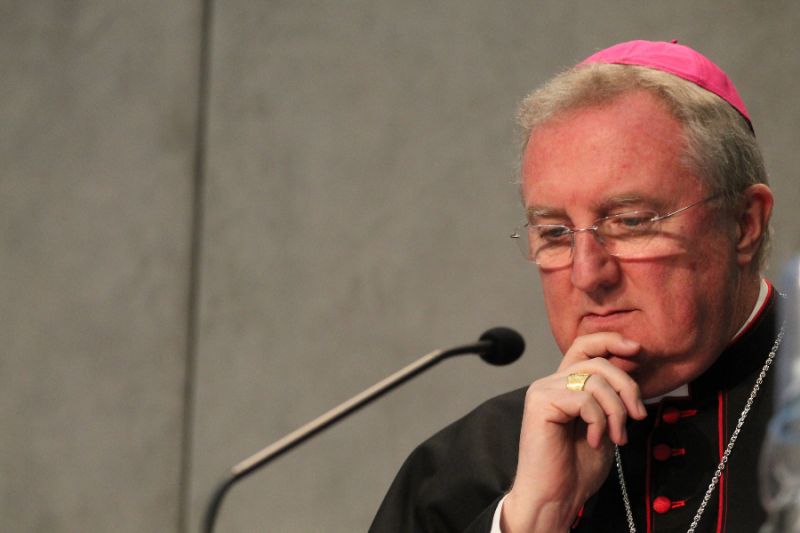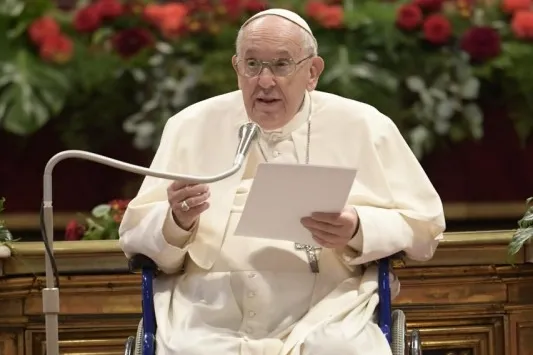
CNA Newsroom, Mar 30, 2023 / 13:30 pm (CNA).
The Vatican’s liturgy czar has intervened against the implementation of resolutions of the German Synodal Way that demand laypeople should be able to regularly baptize and preach the homily at Mass in churches across Germany.
In a letter to the German Bishops’ Conference president dated March 29, Cardinal Arthur Roche said neither was possible — despite at least one German diocese already announcing both practices.
The written intervention by the Vatican’s prefect of the Dicastery for Divine Worship and the Discipline of the Sacraments was addressed to Bishop Georg Bätzing of Limburg, reported CNA Deutsch, CNA’s German-language news partner, which has obtained a copy of the document.
Apart from covering the question of homilies and baptisms by laypeople, the seven-page letter also reminded the German bishops that liturgical translations must be confirmed and approved by the Vatican.
On the issue of homilies, Roche wrote that the reason why laypeople cannot regularly preach at Mass is not due to their need for “better theological preparation or better communication skills.” Nor is the intent to create “inequalities among the baptized.”
Instead, the cardinal pointed to “distinctions made by the Spirit, who produces different charisms that are distinct and complementary.”
Roche wrote that well-formed laypeople should contribute, for instance, as catechists or by conducting conversations about sacred Scripture.
However, he added that laypeople could not give the homily at Mass since only someone ordained “sacramentally represents Christ by virtue of the sacra potestas [sacred power] conferred on him at ordination.”
Explaining that the issue of preaching at Mass was, in other words, a sacramental rather than an educational matter, Roche warned of “misunderstandings” about the figure and identity of the priest, who is the only one who can act ‘in persona Christi capitis’ [in the person of Christ, the head of the Church] by virtue of the sacrament.”
The cardinal also rejected the introduction of laypeople regularly administering baptisms, something already in practice in some German dioceses. He wrote that justifying this with a lack of priests, for example, was not possible under canon law.
Laypeople could only validly perform baptisms in exceptional circumstances, such as in danger of death or “in painful situations of persecution, but also in mission areas and in other cases of special need,” the cardinal explained.
Papal appeal to unity
Roche reminded the German bishops of Pope Francis’ 2019 letter regarding the direction of the Synodal Way process. “The universal Church lives in and from the particular Churches, just as the particular Churches live and flourish in and from the universal Church; if they were separated from the universal Church, they would weaken, decay, and die,” the pope wrote at the time.
Responding to Roche’s communication, a spokesperson for the German Bishops’ Conference on Thursday said the bishops would continue to seek dialogue with Rome on these issues.
Earlier this month, several German bishops announced plans to implement several resolutions passed by the Synodal Way.
Bishop Franz-Josef Bode of Osnabrück — then vice president of the German Bishops’ Conference — said laypeople could baptize babies and “regularly” preach at homilies in his diocese.
About one week later, on March 25, the Holy See announced that Pope Francis had accepted Bode’s request to resign.
If you value the news and views Catholic World Report provides, please consider donating to support our efforts. Your contribution will help us continue to make CWR available to all readers worldwide for free, without a subscription. Thank you for your generosity!
Click here for more information on donating to CWR. Click here to sign up for our newsletter.





Welcome balm on an open laceration within the universal Church, this instruction from Cardinal Roche…Historically, der Synodale Weg reminds us of Edward Gibbon who reduced the early Church to a “state within the State”…
Now, after two millennia, the German bishops simply flip this notion to its opposite–with secularism and the State as “a church within the Church!” (The Bats-sing pontification: “Catholic but in a different way!”)
“[Roche’s] “…letter also reminded the German bishops that liturgical translations must be confirmed and approved by the Vatican.”
If Roche insists on control of liturgy, he should adopt the authority and language of VCII. Sacrosanctum Concilium: 36.1. “…the Latin language is to be preserved in the Latin rites.”
If every prayer in every Mass in every part of the universally Roman Catholic Church were in the traditionally sacred language of the Church, in the sacred language of the Mass of the Ages, in the sacred language of the Roman Catholic Faith, Roche would not need to remind any bishop about language.
What Roche says today from a self-directed authority will surely be disregarded and discarded in short order.
The denotating and connoting–the fundamental meaning of all vernacular words–undergo change with time. [The word “homophobia” did not exist in the English lexicon until the mid 1960s.]
The vernacular is a weak instrument in which to worship the infinitely immutable, transcendent and invisible Divine Being. His WORD and HIS Words shall NEVER change or develop new meanings. His words and His Life told with reverence in the traditional language of the faith in the Traditional Latin Mass need no submission to any partner of a pontiff.
Yes, to the permanence of the Latin meanings: “Sacrosanctum Concilium: 36.1. ‘…the Latin language is to be preserved in the Latin rites.’”
Historically, as the Romance languages continued to evolve, the 9th-century Charlemagne tried to re-establish the original Latin language—partly because he believed that God heard prayers only when voiced in Latin (so it is said). Later, and instead, the returning Crusaders now fully celebrated their national languages—having seen how the Muslims identified with the untouchable, and yet national language of Arabic—spoken by Allah to Muhammad. And, there were even crusaders who believed that Charlemagne would return from the dead, something like Islam’s awaited “mahdi” who mysteriously disappeared, also in the 9th century.
Thinking even more multiculturally, it was even a Chinese emperor who, when he was asked what he would do to restore sanity in the realm, said: “I would restore the meaning of words!” St. Augustine, both a Berber and a Catholic, speaks to this awkward fit between history and eternity: “We can say things differently, but we can’t say different things!”
So, there’s a great deal to be said in any language about the Old Testament’s Babel story versus crucially stable meanings. Lots of tsunami flood water under the bridge since the Vatican Council, and a few assassinated corpses—like Pope Benedict XIV’s Summorum Pontificum with two forms of the one Rite (2007).